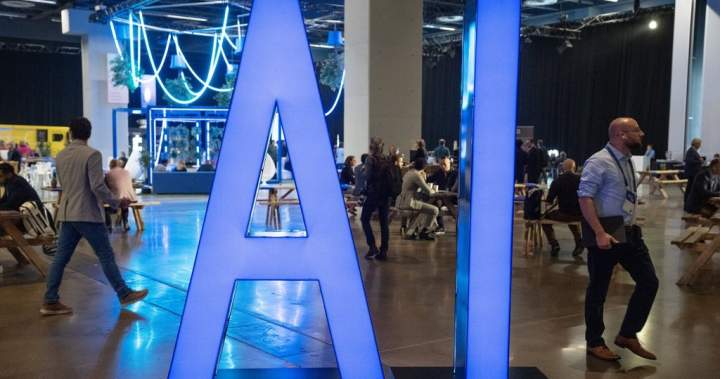A former executive at Google says that Artificial Intelligence (AI) could lead to a “short-term dystopia as early as 2027” unless there are “systematic” changes in how AI is prioritized worldwide.
“CEOs are celebrating that they can now get rid of people and have productivity gains and cost reductions because ‘AI can do that job,’” said software engineer Mo Gawdat, who previously served as chief business officer at Google, speaking on a podcast.
Gawdat says that more white-collar workers are going to be at risk of losing their jobs in this “dystopia” scenario, and it may not be just entry-level workers either.
“The one thing they (CEOs) don’t think of is AI will replace them, too,” he said.
Although research in AI technology stretches back several decades, these modern applications have rapidly accelerated within the past couple of years. Companies behind some of the biggest AI developments include META, Alphabet (Google), and OpenAI, the makers of ChatGPT.
Now that actual human jobs could be replaced in favour of AI alternatives, some business leaders and policymakers are still optimistic about the potential for job creation — but that may not be the case, according to Gawdat.
“Machines replaced human strength at a certain point in time,” he says in describing the use of machines in sectors like manufacturing and industry, and adds, “similarly, AI is going to replace the brain of a human.”

Get breaking National news
For news impacting Canada and around the world, sign up for breaking news alerts delivered directly to you when they happen.
Gawdat also describes “knowledge workers” in western society as “people who work with information typed at a keyboard, clicked with a mouse, or produced with designs,” and adds: “Everything we produce in western society can be produced by AI.”
Humans will likely have some roles alongside those of AI to provide a “human connection,” Gawdat says, but those roles will have limitations in terms of career opportunities.
“We could see a sort of gradual shift away from these jobs rather than mass layoffs, and layoffs in the Canadian economy over the past few years have been pretty low,” says economist Brendon Bernard at Indeed during an interview with Global News on Wednesday.
“Ultimately, adoption of the technology is uncertain, and how it’s applied, and whether it’s applied in a way that complements workers — it’s too soon to know for sure.”
The concerns about how AI could impact society and workers come amid a period of significant global economic and political instability and uncertainty.
In January, the Government of Canada released a report theorizing possible scenarios for social mobility in Canada by the year 2040.
Wealth inequality is one issue highlighted that could affect socioeconomic conditions, leading to increased poverty and job losses.
In the case of Artificial Intelligence, the report theorized one potential scenario where “(by) 2040, the value of human labour has shrunk because of Artificial Intelligence (AI). AI is widespread and can do many things well. In creative to knowledge fields, less work is available. Most people rely on gig work and side hustles to meet their basic needs,” the government report says.
“It is hard for workers to save enough to start a business. People use AI assistants for many day-to-day tasks. They make it easier to organize work and earn money. However, the best AI assistants are expensive. This reinforces structural inequalities.”
While the report was done by a government unit that tries to map out potential scenarios that could be used to shape government planning and policies for the future, the report was not predicting that as something that would happen — rather, one that could happen.
The Government of Canada has also taken note of how the future could look unless changes are made.
“AI is transforming how we work and live and how services are delivered,” the government says on its website.
“It enables computers to do things that previously could only be done by humans, such as generating written or visual materials or making important predictions, decisions and recommendations. It is increasingly being used in areas like finance, human resources and digital services.”
In addressing the need for a rapid response in creating policies surrounding the evolving technology landscape, Prime Minister Mark Carney in May appointed Evan Solomon as minister for artificial intelligence in a first.
Solomon said in his first speech after being appointed as minister that the government will be less focused on regulations and more on the economic benefits of technologies like AI, while protecting the data and privacy of Canadians.
A Global News request to Solomon for his response to the assertions in the podcast, including that of an imminent “short-term dystopia,” was not returned by publication time.
“We need to ask our governments to start not regulating AI, but regulating the use of AI,” says Gawdat.
In the meantime, Bernard said those concerned about job security should be thinking about how to develop AI skills themselves.
“Transformative changes are going to be happening at organizational levels. But I think for an individual, being able to harness these AI tools yourself is a really powerful way that you can stand out both at your current employer or to prospective employers,” says Bernard.
“We track mentions of ‘AI’ in Indeed job postings, and they’re more often seen in the tech sector, but we also see them increasingly in other areas of the economy as well. At the end of June we were at four per cent of Canadian job postings mentioning some form of AI in their job description, and that share has been rising quite rapidly.”
Read the full article here

